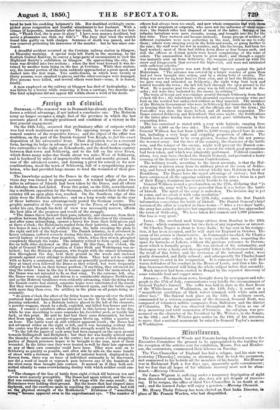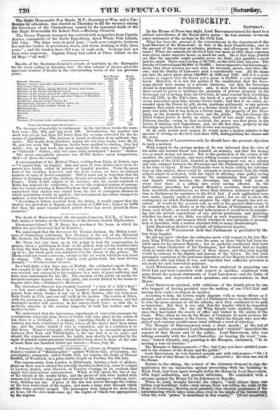311iou1tanroits..
The Commissioners of Woods and Forests having delivered over to the Executive Committee the ground to be appropriated to the building for the reception of the articles sent for exhibition, Messrs. Fox and Hender- son, the contractors, commenced their labours on Tuesday. The Vice-Chancellor of England has had a relapse, and his state was yesterday [Thursday] evening so alarming, that he took the sacrament, and summoned to his bedside all the members of his family. His Honour was in Richmond Park a few days ago, apparently quite convalescent; but we fear that all hopes of his ultimate recovery must now be aban- doned.—Morning Chronicle. Sir James Wigram is suffering under a temporary depription of sight from disordered stomach, .but he also does not yet despair of recover- ing. If he resigns, the office of third Vice-Chancellor is no doubt at an end; and the learned Judge will enjoy a pension.—Morning Chronicle. Mr. Henry Thoby Prinsep has been elected an East India Director, i* place of Mr. Francis Warden, who had disqualified. The Right Honourable Fox Maule, M.P., Secretary at War, and a Car- thusian by education, was elected on Thursday to fill the vacancy among the Governors of the Charterhouse caused by the lamented death of the late Right Honourable Sir Robert PeeL—Morning Chronicle. The Emma Eugenia transport has arrived with despatches from Captain Austen, commander of the Arctic Expedition, dated Whale Fish Islands, 23d June. The ships were in good gear; each now complete, between her and her tender, in provisions, stores, and warm clothing, to fully three years" ; and the tenders have 310 tons of coals each. Icebergs had not been very numerous. Captain Penny had called at Disco Island on the 2d May—" all well."
Results of the Registrar-General's return of mortality in the Metropolis for the week ending on Saturday last : the first column of figures gives the aggregate number of deaths in the corresponding weeks of the ten previous years.
Total (Including unspecified causes)
The increase of mortality is continuous : in the last three weeks the num- bers were-781, 863, and last week 898. Nevertheless, the number last week was yet no less than 217 fewer than the average corrected for the in- crease of population. The increase is found in diseases of an epidemic cha- racter. The deaths from diarrhoea, during the last four weeks, were 40, 37, 61, and last week 104. Thirteen deaths were ascribed to cholera, (five last week) ; but, as last week, the great majority of the cases were 'English" or "Infantile" cholera, only two cases being nominated "Asiatic" cholera. The mean atmospheric pressure was 29.691 inches; mean temperature, 63.4°-2° above the average.
A correspondent of the Medical Titnes, writing from Paris, of cholera, says —"I cannot find, on inquiry, that any cases of true cholera have been ob- served here lately, either in private or hospital practice. From the great heat of the weather, however, and the fruit season, we have an unusual number of cases of bowel complaint. Still it must not be forgotten that the disease is hanging about the confines, though not actually on the territory of France. Tunis is still subject to its ravages and the recent outbreak at Malta has induced the authorities to revive the exploded system of quaran- tine for vessels arriving at Marseilles from that island. It had been generally understood that cholera was erased from the list of contagious diseases to which quarantine would be applied ; but Government has either changed its opinion, or fear has revived the practice.
"According to letters received from the Andes, it would appear that the cholera was prevalent at Bogota, an elevation of 7,800 feet ; higher by 6,000 feet than the point beyond which yellow fever has never passed in those countries."
The death of Major-General Sir Alexander Cameron, K.C.B. of Inveral- lost, makes a vacancy in the Coloneky of the Seventy-fourth Highlanders.
Lieutenant-Colonel W. N. Burns has purchased the house in which his father the poet lived and died in Dumfries.
We understand that the Reverend Dr. Thomas Jackson, the Bishop nomi- nate of' Canterbury settlement, New Zealand, is the son of the Reverend Mr. Jackson, the President of the Wesleyan Conference.—Gloucester Journal.
Mr. Thom had just risen up in the pulpit to lead the congregation in prayer, when a gentleman in front of the gallery took out his handkerchief to wipethe dust from his brow, forgetting that a pack of cards was wrapped up in it ; the whole pack was scattered over the breast of the gallery. Mr Thom could not resist a sarcasm, solemn as the act was in which he was about to engage. "Oh, man, man ! surely your psalm-book has been ill-bun (bound) !"—Westmordand Gazette. In a bull-fight a few days ago, at Madrid, the celebrated espada Mentes was caught in the calf by the horn of a bull, and was raised in the air. He VMS rescued, and conveyed to his residence in a state of great suffering, and fears were entertained for his life. The emotion of the public on seeing the favourite toreador injured was very great, and crowds flocked to his house to inquire after him.--Galignani's _Messenger.
The Gateshead Observer has recently received "a lock of a lady's hair" —a lock snow-white, blanched by a hundred and nineteen winters. The person from whose tresses it was cut is Mary Benton, who was born near Baby Castle in 1731, and can still walk in the garden. She resides at Elton, with her grandson, a farmer. Her daughter keeps a public-house' and her husband's mother still survives, in her ninety-sixth year ; so that she is probably singular in the extreme longevity of both her mother and her mother-m-law.
We understand that the interesting experiment of conveying messages by a submarine telegraph from Dover to Calais will take place in the course of ten days or a fortnight. A company, consisting chiefly of English share- holders, has been constituted in Paris, where all the shares have been taken up ; and the entire length of wire is completed, and in a condition to be laid down. House's telegraph, which has long been in successful operation between New York and Philadelphia, is the one that is to be used ; and should the experiment succeed, the public may shortly be gratified by the sight of printed communications transmitted from shore to shore at the rate of more than one hundred letters per minute.—Times, July 29.
A Coroner's Jury empanelled yesterday, at a house on Frimley Common
,, found a -verdict of Manslaughter " against William Gill, of Coventry, the
prizefighter, i commonly called Paddy Gill, for causing the death of Thomas Griffith, of Woolwich, n a prize-battle fought on Tuesday the 23d July:
The express-train from London to Edinburgh, bearing a load of philoso- phers on their way to attend the scientific meeting in that city, came to a stand at Lesbury station, near Alnwick, on Tuesday evening, by an accident that might have had serious consequences. When at full speed, the tire of one of the wheels of the tender broke, and the pieces of iron were hurled with cannon-ball velocity close past the windows of the carriages—without, how- ever, striking any one. A. piece of the tire was forced through the bottom of the iron water-tank of the tender, and made a large rent through which all the water quickly escaped. The passengers were delayed for more than an hour, till the slow-tram came up ; the engine of which was appropriated by the express.
Zymotic Diseases Dropsy, Cancer, and other diseases of uncertain or variable seat 4/9 Tubercular Diseases 1920 Diseases of the Brain, Spinal Marrow, Nerves, and Senses 1179 Diseases of the Heart and Blood-vessels 249
Diseases of the Lungs, and of the other Organs of Respiration 776
Diseases of the Stomach, Liver, and other Organs of Digestion 752 Diseases of the Kidneys, 8/c 86 Childbirth, diseases of the Uterus, lie 97
Rheumatism, diseases of the Bones, Joints, dte se
Diseases of the Skin, Cellular Tissue, &e. 8 Malformations 24 Premature Birth 228 Atrophy 235
Age 435
Sudden 84 'Violence, Privation, Cold, and Intemperance 235
—
10217 Ten Weeks Week. of 1839-49. of 1850. 3315 272 37 170 104 83 74 62 14 6 1 6 31 27 31 1 25 898



























 Previous page
Previous page